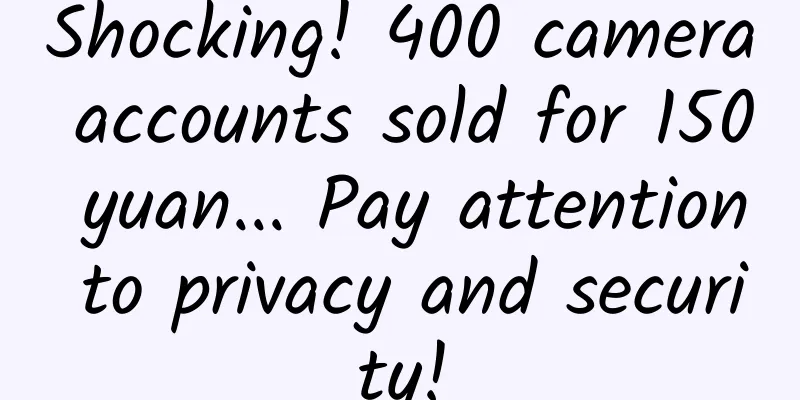Shocking! 400 camera accounts sold for 150 yuan... Pay attention to privacy and security!

|
Since the beginning of this year, the Cyberspace Administration of China, together with the Ministry of Industry and Information Technology, the Ministry of Public Security, and the State Administration for Market Regulation, has deepened the centralized governance of illegal activities such as camera peeping, and has centralized the governance of illegal uses of cameras to peek into personal privacy, trade private videos, and teach peeping and secretly filming techniques, among other acts that infringe on citizens' personal privacy. 400 accounts, 150 yuan camera spying on black production, shocking
Xiao Zhou, who lives in Beijing, told reporters that he is very busy at work and has elderly people and children at home, and he is worried that he cannot be at home to take care of them. In order to save trouble, he just bought a camera online for checking. Unexpectedly, his home was "spied on" by criminals. By searching for some keywords, security technicians quickly discovered that there are a large number of groups related to camera peeping on some social platforms. When they entered the relevant chat groups, the chat content was even more explicit, and some people posted real-time images of the cameras from time to time. Zhang Jiaqi, senior engineer of the National Internet Emergency Center: The chat in the group is still quite active. Some people will ask how to see the cracked cameras and how to obtain the camera ID account. 400 camera IDs are 150 yuan. He also sells special black market scanning tools for 300 yuan. The black market scanning tool can scan thousands of camera IDs in 1 minute. Because many camera passwords are not changed now, and the initial default username and password are used, once they obtain these camera IDs, they can view the real-time images of a large number of cameras. Following the seller's instructions, the security personnel downloaded and installed Cloud Vision, and then used the software to scan the channel . After entering the user ID and password, a large number of cameras' real-time monitoring appeared on the computer screen, and the people in the picture were in a completely unaware state. Liu Zhongjin, senior engineer of the National Internet Emergency Center: Most of the cameras sold by the camera peeping black market are for private places such as hotels, homes, and bedrooms. The information of these cameras has been repeatedly sold, and the black market personnel have made huge profits from it. The leakage of these tens of thousands of camera images has seriously infringed on the privacy of citizens. The reporter learned that in recent years, the black industry such as camera peeping has continued to develop and evolve, and the division of labor in the industrial chain has become increasingly refined. How to deal with problematic apps? The Central Cyberspace Affairs Commission has also taken a number of measures. Xing Yanzhen, an engineer at the National Internet Emergency Center: By screening based on some keywords in the app store, we found more than 100 camera-related apps, of which 8 camera apps had some serious vulnerabilities. For example, the UID (user identity verification) generation algorithm was problematic, and the camera access authentication mechanism was not perfect, which means that it was unable to distinguish between normal users and illegal users. The Cyberspace Administration of China has guided various regions and platforms to deal with more than 30,000 pieces of harmful information related to the black industry of peeping cameras, and more than 5,600 accounts involved in illegal transactions and the dissemination of harmful content; urged the removal of peeping and secretly filming apps such as "Secret Camera" and "Invisible Photographer"; and summoned e-commerce platforms to urge them to remove miniature cameras and other peeping equipment. Guo Tao, deputy director of the Cyber Security Coordination Bureau of the Central Cyberspace Administration of China: We have interviewed apps such as CloudView, Leiweishi, and HiSilicon that have some vulnerabilities. In the early stage, there were about 450,000 cameras that could be remotely peeped at, which were reported by the public and monitored by us. At present, all of them cannot be exploited. Guo Tao said that in order to evade regulatory crackdowns, black market personnel at all levels often use fake accounts, springboard IP addresses, other people's phone cards and bank cards to conceal their identities. At present, these behaviors have been effectively curbed. Experts have also given suggestions on how individuals can prevent their cameras from being illegally spied on. Liu Zhongjin, senior engineer of the National Internet Emergency Center: First, purchase cameras from big brands through formal channels and those that have passed network security certification to avoid backdoors. Second, the camera should not be pointed towards sensitive areas; Third, change the default password of the camera, preferably to a complex password, a strong password; Fourth, keep updating the camera’s firmware and App regularly. Source: CCTV Finance |
Recommend
How do merchants choose the WeChat mini program platform?
As mini programs continue to develop, many busine...
Love Course 5000G: 2021 Complete Set of Teaching Methods for Picking Up Girls (with Full Course Catalog, Updates Included) Baidu Cloud Download
We have integrated hundreds of emotional teams fr...
The Bronze, Silver and Golden Ages of Chinese Makers
The word "maker" comes from the transla...
A collection of 50 medical beauty marketing cases and market research reports
A collection of 50 medical beauty marketing cases...
How to apply for WeChat Video Account? How to use WeChat Video Account?
At the beginning of 2020, in a video speech at th...
American pickup trucks target the Chinese market, with wealthy customers as their target users
According to foreign media reports, Ford and Gene...
Will children grow taller if they are hungry at night? It’s not that simple…
Rumor: "If you go hungry at night, your chil...
Coffee dripped onto table, so scientists found a way to detect malaria
In life, everyone has the experience of accidenta...
Promotional Marketing: A brief discussion on vlog’s brand marketing and traffic monetization!
With the vigorous development of the Internet sho...
What is this spider-like fruit that's suddenly become popular? Is it delicious?
With the development of logistics management and ...
Six major questions facing Apple's core products
As is Cook's usual style, he will certainly c...
This discovery that changed the fate of mankind was the result of the hard work of many Nobel Prize winners.
Nuclear energy is a double-edged sword for mankin...
The monthly active users of the APP exceeded 10 million! Daily Youxian user growth tips!
On October 28, Trustdata, a mobile big data monit...
Tencent Interactive Entertainment Community Product User Growth Formula!
The development of the Internet has entered the s...
iOS 15.6.1 official version update, recommended to upgrade
Early this morning, Apple released the official v...









![[Second issue] Popular science talk: Actually, this is a misunderstanding - "little-known facts" about National Fitness Day](/upload/images/67f22621b01b5.webp)